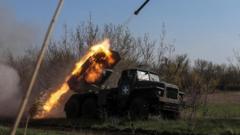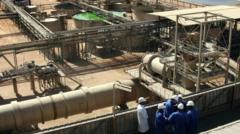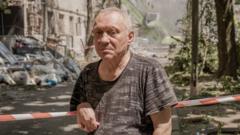In a significant show of support, Ukraine's allies have committed €21 billion in military aid, targeting critical needs as the war’s intensity escalates.
Ukraine Receives €21bn Military Aid Boost from Allies

Ukraine Receives €21bn Military Aid Boost from Allies
European defense ministers unite to bolster Ukraine's military capabilities amid ongoing conflict.
Ukraine's European allies have formally pledged a substantial €21 billion ($24 billion; £18 billion) in military support directed toward bolstering Kyiv amid what has been labeled as "a critical year" for the war. The support aims to enhance Ukraine's military capacity, particularly as tensions continue to rise.
Germany leads this robust initiative with a commitment of over half the pledged amount, specifically €11 billion slated for distribution across four years. UK Defence Minister John Healey emphasized this collective action as a decisive warning to Moscow, reinforcing unity among European nations.
The pledges were announced during a meeting of the Ukraine Defence Contact Group at NATO’s headquarters in Brussels, where leaders deliberated on necessary equipment, including air defense systems, missiles, and drones, to address changing dynamics following the U.S. shifts under former President Donald Trump’s administration.
The immediate military assistance includes a notable package of £450 million ($590 million) from the United Kingdom and Norway aimed at improving radar systems, anti-tank mines, vehicle repairs, and drones for the Ukrainian defense forces. This sizable contribution forms part of a larger British commitment of £4.5 billion announced earlier this year.
Air defense systems emerged as a priority from the discussions in Brussels. Healey highlighted alarming statistics from the battlefield, noting that 70-80% of battlefield casualties are now attributed to drone warfare. To tackle this, Germany's pledge includes sophisticated artillery support, with Defence Minister Boris Pistorius announcing the shipment of 100,000 rounds of artillery ammunition, various vehicles, and ground surveillance radars.
In total, the German commitment encompasses four IRIS-T air defense systems, equipped with 300 missiles, marking a substantial escalation in military provisions. The overarching message from German officials is clear: "Ukraine needs a strong military to engage in meaningful negotiations towards a lasting peace."
The Brussels meeting gathered defense ministers from 50 nations, with U.S. Defence Secretary Pete Hegseth participating virtually, reinforcing America's ongoing commitment to support Ukraine. Despite logistics surrounding Hegseth's virtual attendance, German minister Pistorius reassured that his involvement underscored continued American backing.
Ukrainian officials, including Defence Minister Rustem Umerov who attended the meeting in person, expressed gratitude towards Europe for taking a leading role in securing assistance for Ukraine’s defense efforts.
Amidst these developments, Healey, Pistorius, and Umerov all voiced concerns regarding Russia's lack of commitment to a ceasefire. Speculation around ongoing diplomatic efforts persisted, with U.S. special envoy Steve Witkoff engaging with Russian President Vladimir Putin to advocate for a ceasefire.
On the frontline, reports from Russia’s defense ministry suggested they had captured the village of Zhuravka in Ukraine’s Sumy region, although confirmation from Ukrainian officials is pending. President Zelensky recently indicated the buildup of 67,000 Russian soldiers poised to launch a potential attack on Ukrainian territory, elevating tensions in the region.





















